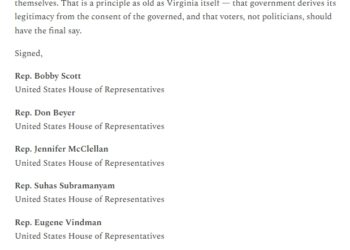Great job by Rep. Connolly, who’s been relentlessly pounding Republicans for their disgraceful witch hunt and political grandstanding on Benghazi. For instance, on his Twitter feed, Rep. Connolly says the Benghazi hearing is “[Rep.] Issa at his worst. Falsehood upon falsehood. Blatant exploitation of a tragedy for partisan purpose.” Rep. Connolly adds, “60 mins into OGR #Benghazi hearing. No new facts or revelations Nothing to support outrageous GOP charges” and “Greg Hicks tells moving account of his experience but nothing about suppression or conspiracies.” So true.
Also, check out Rep. Connolly’s statement, on the “flip,” in which he points out that “[t]oday’s hearing is the fifth time House Republicans have convened a congressional committee to ‘examine’ the attack on the American consulate in Benghazi.” Connolly also notes, correctly, that the Republicans’ (disgraceful, outrageous) behavior in this case is in stark contrast to “the reaction to past attacks on our people and soil.” For example, Rep. Connolly specifically refers to “the sorrowful events of October 1983, when a truck filled with 2,500 pounds of TNT slammed into the United States Marine Corps barracks in Beirut, killing 241 U.S. servicemembers.” At that time, as Rep. Connolly correctly points out, “I recall President Reagan and his Cabinet responding to substantive questions about the security of our foreign service personnel rather than to partisan attacks that should stop at the water’s edge.” Sadly, today’s Republicans have morphed into the John Birch Society, not the serious, respectable (and respectful) party it used to be.
Today’s hearing is the fifth time House Republicans have convened a congressional committee to “examine” the attack on the American consulate in Benghazi; if one includes all the briefings on this issue, it is the ninth such meeting on the House side alone. The latest development is the publication of a partisan Interim Progress Report by five House Republican Chairmen. The systematic exclusion of the minority membership in the report is unprecedented. Ranking Member Cummings expressed discontent in a letter to Speaker Boehner at the “decision to abandon regular order and exclude Democratic Members from the process.”[1]
The report attempts to fault then-Secretary of State Hillary Clinton for the Benghazi terrorist attack because a State Department cable to Tripoli regarding additional security included Secretary Clinton’s signature. Glenn Kessler, author of the Fact Checker blog on The Washington Post, called the signature allegation a whopper and awarded it “Four Pinocchios.” The Fact Checker went on to say that one House Chairman’s claim that “Clinton’s ‘signature’ means she personally approved” the cable is “absurd,” as every single cable from the State Department includes the Secretary’s signature, regardless of content or gravity.[2]
The reaction to the Benghazi attack differs from the reaction to past attacks on our people and soil. For example, I recall the sorrowful events of October 1983, when a truck filled with 2,500 pounds of TNT slammed into the United States Marine Corps barracks in Beirut, killing 241 U.S. servicemembers. I was a staffer on the Senate Foreign Relations Committee at the time and had just visited the barracks in Beirut, and I recall President Reagan and his Cabinet responding to substantive questions about the security of our foreign service personnel rather than to partisan attacks that should stop at the water’s edge.
Two of today’s witnesses are appearing before the panel for the first time. Mr. Mark Thompson is the Deputy Coordinator for Operations, Bureau of Counterterrorism and Mr. Gregory Hicks is the former Deputy Chief of Mission (DCM) of Embassy Tripoli. Mr. Thompson refused, through his lawyer, to speak with Members of the minority but Mr. Hicks met with minority staff. According to the interview that staff conducted, Mr. Hicks agreed with the Accountability Review Board (ARB) finding that security was inadequate in Benghazi; he also emphasized the need for training for personnel deployed to high threat posts.[3] Mr. Hicks went on to say that the “tone of voice” of State Department Chief of Staff Cheryl Mills indicated she was not happy after one Republican Congressman’s visit. In Mr. Hicks’ own words:
I just felt from the way the conversation, the sort of tone of-again, tone of voice, the questions that were asked by Cheryl Mills that the way I had-the way the visit had gone, fallen out, had transpired, was not a happy development from her perspective. No direct criticism beyond that.[4]
Regarding Mr. Hicks’ conversation with Beth Jones, Acting Assistant Secretary of State for Near Eastern Affairs, Mr. Hicks referred to Ms. Jones’ “tone of voice” in characterizing her response to the immediate aftermath of the Benghazi attack.[5] I hope we can hear more detail about Mr. Hicks’ interpretation of others’ reactions to the aftermath of the attacks.
The ARB report clearly states, “Responsibility for the tragic loss of life, injuries, and damage to U.S. facilities and property rests solely and completely with the terrorists who perpetrated the attacks.”[6] The report also paints a clearer picture of the context of post-Revolution Libya and the enemy that our people are facing in the region-a “growing, diffuse range of terrorist and hostile actors” who “[pose] an additional challenge to American security officers, diplomats, development professionals and decision-makers seeking to mitigate risk and remain active in high threat environments without resorting to an unacceptable total fortress and stay-at-home approach to U.S. diplomacy.”[7] Such an enemy would be challenging to face under normal circumstances, and a post-Revolution environment exacerbates the situation. In Libya, the day-to-day situation was characterized by the “security vacuum left by Qaddafi’s departure”[8] and a “general backdrop of political violence, assassinations…., lawlessness, and an overarching absence of central government authority in eastern Libya.”[9]
With the benefit of hindsight, the ARB report pinpoints management and system failures that resulted in inadequate security on the ground in Benghazi, but it also details growing challenges State has faced “to obtain the resources necessary to carry out its work.”[10] Based on this finding, it is clear the availability of resources was, and continues to be, a major issue for our missions abroad, but you wouldn’t know that based on the Republican rhetoric surrounding this subject.
Ambassador Pickering and Admiral Mullen were brutally honest about the sacrifice that our personnel knowingly face when serving overseas in hostile environments:
“No diplomatic presence is without risk… And the total elimination of risk is a non-starter for U.S. diplomacy, given the need for the U.S. government to be present in places where stability and security are often most profoundly lacking and host government support is sometimes minimal to non-existent.”[11]
Let’s not lose sight of the fact that America’s foreign aid and diplomatic posts are not just nice things to do. They are important and sometimes dangerous jobs and critical components of our national security policy. These public servants put themselves on the line every single day to advance America’s economic and humanitarian interests across the globe, and we must ensure they have the tools and security necessary to achieve this mission.

![[UPDATED with Official Announcement] Audio: VA Del. Dan Helmer Says He’s Running for Congress in the Newly Drawn VA07, Has “the endorsement of 40 [House of Delegates] colleagues”](https://bluevirginia.us/wp-content/uploads/2026/02/helmermontage.jpg)
















